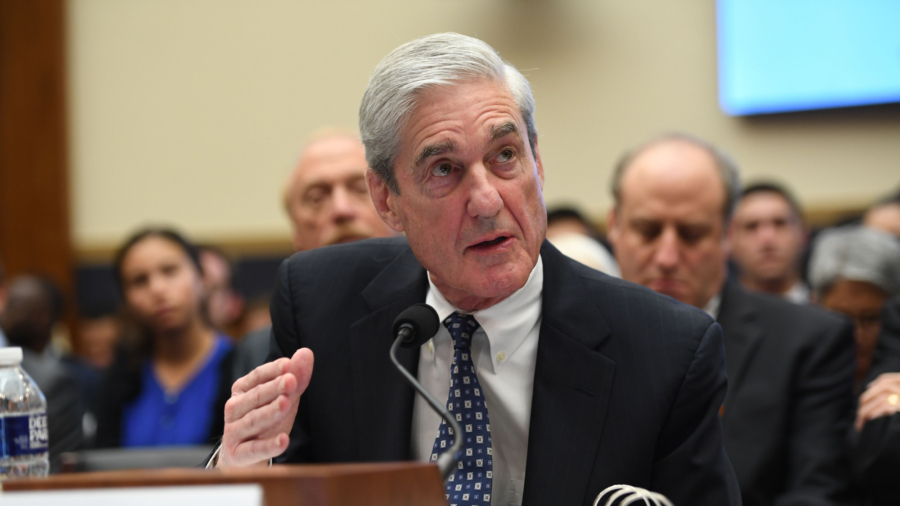A federal judge has ordered the Justice Department (DOJ) to publish a less-redacted version of former special counsel Robert Mueller’s report on Russian interference in the 2016 presidential election.
Judge Reggie Walton of the U.S. District Court for the District of Columbia said on Wednesday that the department had failed to properly demonstrate the redacted information could be protected by a Freedom of Information Act exemption called the deliberative process privilege.
This exemption covers internal communications in the Executive Branch and is usually invoked to protect the decision-making process in federal agencies. One of the purposes of the deliberative process privilege is to “avoid chilling and distorting the candid discussion needed for optimum decisionmaking inside government agencies,” according to the DOJ.
The DOJ argued that the redacted information in the report was protected by the privilege because the information was related to “deliberations about charging decisions not to prosecute, which would reveal criminal charges considered but not pursued against certain named individuals under investigation.”
Walton, who had reviewed the unredacted version of the Mueller report, did not agree, concluding that the DOJ failed to show that it met the threshold requirement to invoke the privilege.
The dispute regarding the release of information in the Mueller report stems from a lawsuit brought by BuzzFeed, its investigative journalist Jason Leopold, and the Electronic Privacy Information Center (EPIC), a nonprofit research center. The plaintiffs have been seeking the release of an unredacted Mueller report.
Although Walton said the DOJ was required to release information that was withheld under the deliberative process privilege, the department was still able to keep some information redacted under other exemptions such as exemptions protecting grand jury information, privacy, and law enforcement information.
In March, the department turned over an unredacted version of the Mueller report to Walton who had demanded to see the report.
Walton had several complaints about Attorney General William Barr’s handling of the release of the Mueller report. He pointed out that there were inconsistencies between the report and Barr’s summary of investigative findings he provided prior to the report’s release.
“The speed by which Attorney General Barr released to the public the summary of Special Counsel Mueller’s principal conclusions, coupled with the fact that Attorney General Barr failed to provide a thorough representation of the findings set forth in the Mueller Report, causes the Court to question whether Attorney General Barr’s intent was to create a one-sided narrative about the Mueller Report—a narrative that is clearly in some respects substantively at odds with the redacted version of the Mueller Report,” Walton said (pdf).
“The inconsistencies between Attorney General Barr’s statements, made at a time when the public did not have access to the redacted version of the Mueller Report to assess the veracity of his statements, and portions of the redacted version of the Mueller Report that conflict with those statements cause the Court to seriously question whether Attorney General Barr made a calculated attempt to influence public discourse about the Mueller Report in favor of President Trump despite certain findings in the redacted version of the Mueller Report to the contrary,” Walton added.
DOJ spokeswoman Kerri Kupec at the time pushed back on Walton’s opinion, saying that the court’s assertions were “contrary to the facts.”
“In response to FOIA requests, the entire report was then reviewed by career attorneys, including different career attorneys with expertise in FOIA cases—a process in which the Attorney General played no role. There is no basis to question the work or good faith of any of these career Department lawyers,” she said in a statement.
Walton ordered the DOJ to produce the less-redacted version of the report on or before Nov. 2.
Leopold, one of the plaintiffs, celebrated the partial victory.


